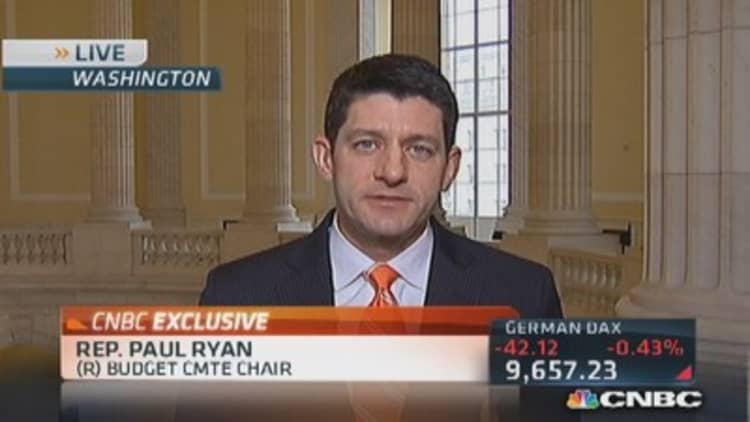
When tax rates are lowered, economic growth is produced. That's how House Budget Committee Chairman Paul Ryan described the GOP approach to reforming the U.S. tax code, in an interview on CNBC Wednesday.
House Republicans this week are expected to float a tax overhaul package that would cut the top income tax rate to 25 percent from 39.6 percent, but levy a surtax on some of the most affluent households.
This idea has little chance of gaining support from the White House. But the former Republican vice presidential candidate told "Squawk Box" on Wednesday: "Just because we have a progressive liberal president and Senate doesn't mean we should do nothing and offer no ideas on how to grow the economy."
The plan—detailed in The Washington Post earlier this week—would impose a 10 percent surtax on certain kinds of earned income over about $450,000 a year.
Ryan explained why this provision is necessary, even though he doesn't like it. "With the code we have—and we're trying to replace it was a revenue-neutral code, which is the parameters we have to deal with—is do some base-broadening that aren't ideal," he said.
(Read more: )
Meanwhile, details emerged last week on President Barack Obama's 2015 budget proposal, which is set to be officially released on March 4.
It won't include a measure to trim cost-of-living increases in Social Security—abandoning a compromise Obama made last year, in exchange for Republicans identifying possible tax loopholes to close.
(Read more: Why Obama's budget will be more DOA than ever)
White House officials said Republicans never followed through on their end of the bargain.
In response, Ryan said: "I think the president is moving farther to the left."
Another hot-button issue dividing Democrats and Republicans is the president's push to raise the federal minimum wage to $10.10 per hour from its current level of $7.25
The Congressional Budget Office estimated last week that such an increase could result in 500,000 lost jobs by late 2016.
Ryan said Wednesday that this would prevent some people from entering the workforce. He also agreed with the CBO's findings that a wage hike would cost jobs.
(Poll: What should the federal minimum wage should be?)
But the nonpartisan CBO also said a hike to $10.10 would bring 900,000 people above the poverty threshold of $24,100 a year for a family of four, and increase their real income by $5 billion.
Instead of raising the minimum wage, the U.S. should be focusing on pro-growth solutions to job growth, as well as education reform and measures to narrow the skills gap, Ryan said.
The Wisconsin Republican declined to comment on whether Arizona's GOP governor, Jan Brewer, should veto a controversial religious freedom bill—which according to critics, would allow businesses refuse service to gay and lesbians.
Ryan did say if what critics say about the Arizona bill is the case: "That sounds ridiculous."
He also cited his record on equality—saying he voted for the Employment Non-Discrimination Act, which prohibits hiring bias on the basis of sexual orientation or gender identity.
As for the long-delayed Keystone XL pipeline from Canada to the U.S., Ryan said he can't imagine the president not approving it. "Even the study [the administration] put out paves the way for Keystone."
(Read more: Keystone pipeline politics 'nuts': Ex-oil chief)
TransCanada's proposed oil pipeline from Alberta, Canada, to Nebraska would link up to the southern leg from Oklahoma to Texas, which opened in January.
"My guess is [Obama] will say yes to Keystone," Ryan predicted, "and then come out with these hardcore coal regulations on existing power plants later this year.
—By CNBC's Matthew J. Belvedere. Follow him on Twitter @Matt_SquawkCNBC. Reuters contributed to this article.


